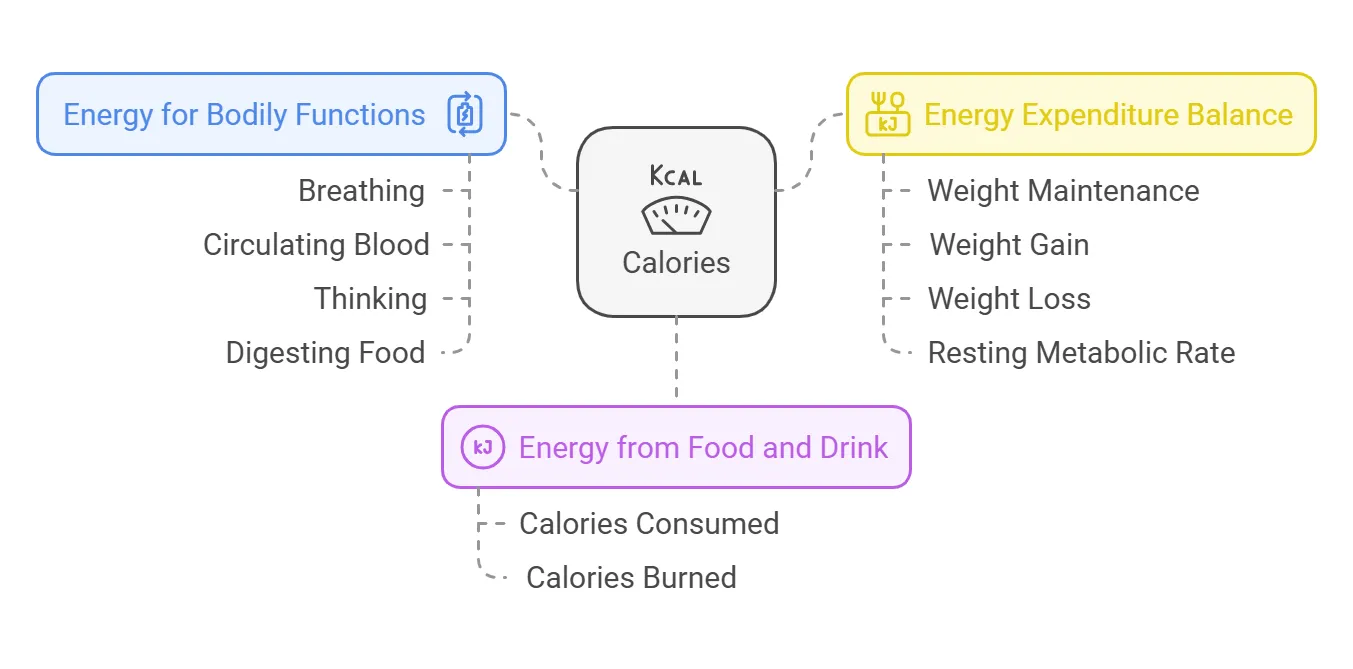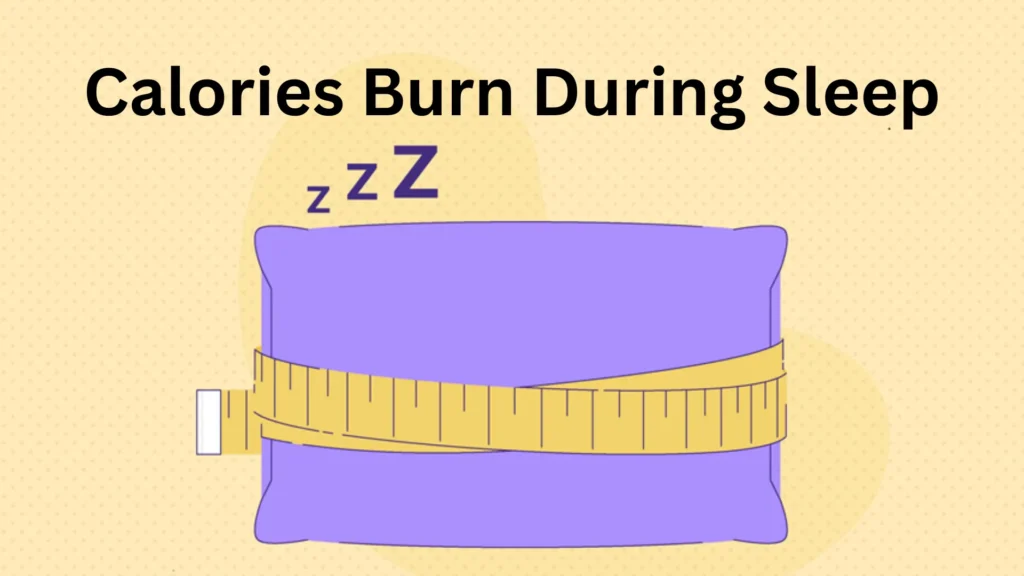Introduction
When most people think about burning calories, they picture a tough workout, a long run, or other physical activities. However, your body is constantly burning calories, even when you’re doing something as passive as sleeping. Sleep isn’t just a time for rest; it’s when your body performs essential functions that require energy. Understanding how many calories do you burn during sleep provides insight into how metabolism works, why sleep is so critical for health, and how it fits into the bigger picture of weight management.
Why It Matters: The Role of Sleep in Health and Weight Management
Sleep is a cornerstone of overall well-being. During sleep, your body is hard at work repairing tissues, consolidating memories, and regulating hormones that impact hunger, stress, and metabolism. These processes demand energy, which means your body continues to burn calories even when you’re not awake.
Getting sufficient, high-quality sleep plays a pivotal role in maintaining a healthy weight. Poor sleep disrupts hormones like leptin and ghrelin, which control feelings of hunger and fullness, potentially leading to overeating. Chronic sleep deprivation has been linked to a slowed metabolism, reduced insulin sensitivity, and increased fat storage. These factors create a cycle where insufficient sleep negatively impacts weight and overall health.
In essence, sleep is more than just a passive activity—it’s a vital part of maintaining energy balance and supporting metabolic health.
What This Guide Covers: A Deep Dive into Sleep and Calorie Burn
This guide takes a comprehensive look at how your body burns calories during sleep. Starting with the basics, we’ll explore what calories are and why they matter, then dive into the science of energy expenditure. You’ll learn how your resting metabolic rate (RMR) drives calorie burn during rest, the factors that influence this process, and how your body’s natural rhythms impact calorie consumption. By the end, you’ll better understand how to harness the power of sleep for optimal health and weight management.
The Basics of Calorie Burn
1. What Are Calories?
Definition and Importance
Calories are units of energy that fuel every function of your body. From breathing and circulating blood to thinking and digesting food, calories provide the energy needed to sustain life. In dietary terms, calories measure the energy you get from food and drink, as well as the energy your body uses to function.
The balance between calories consumed and calories burned determines whether you maintain, gain, or lose weight. While it’s tempting to focus only on exercise as the main way to burn calories, the majority of your energy expenditure happens without conscious effort, driven by processes like your resting metabolic rate (RMR).

The Science of Energy Expenditure
Energy expenditure can be divided into three main components:
- Basal Metabolic Rate (BMR): The energy your body needs to perform basic life-sustaining functions, such as maintaining your heartbeat, breathing, and regulating body temperature. BMR accounts for about 60-70% of total daily calorie burn.
- Physical Activity: This includes any movement, from walking to vigorous exercise, and is the most variable aspect of energy expenditure.
- Thermic Effect of Food (TEF): The energy required to digest, absorb, and process nutrients from food. This accounts for roughly 10% of daily energy use.
Together, these components create the framework for how your body uses calories, whether you’re awake or asleep.
2. How Does the Body Burn Calories?
Resting Metabolic Rate (RMR) Explained
Resting Metabolic Rate (RMR) is the number of calories your body burns while at rest to sustain essential functions like breathing, pumping blood, and maintaining organ function. It represents the largest portion of your daily calorie expenditure, accounting for 60-75% of total energy burn.
RMR is influenced by several factors:
- Body Composition: Muscle tissue burns more calories at rest compared to fat tissue, so individuals with higher muscle mass have a higher RMR.
- Age: RMR tends to decrease with age due to muscle loss and hormonal changes.
- Gender: Men typically have a higher RMR than women, primarily due to differences in muscle mass.
- Genetics: Your inherited traits can impact the speed of your metabolism.
- Hormonal Health: Hormones like thyroid hormones and insulin play a crucial role in regulating metabolic rate.
Even when you’re sleeping, your RMR ensures that your body has the energy it needs to keep functioning.
Activities That Influence Calorie Burn
Beyond RMR, various activities can increase the number of calories your body burns:
- Physical Activity: Movement, whether intentional like exercise or incidental like walking to the fridge, significantly raises calorie expenditure.
- Thermic Effect of Food (TEF): Digesting and metabolizing food burns calories. Protein-rich foods, in particular, have a higher thermic effect compared to fats and carbohydrates.
- Environmental Factors: Being in a colder environment can increase calorie burn as your body works to maintain its core temperature.
- Sleep Quality and Length: While calorie burn is lower during sleep, deep sleep stages and REM (rapid eye movement) cycles require energy to support critical functions like memory consolidation and cellular repair.
Understanding these components of energy expenditure underscores the importance of RMR and highlights how your body is constantly burning calories, even at rest. By focusing on factors that influence RMR, you can optimize your overall metabolic health.
Sleep and Metabolism
1. What Happens to the Body During Sleep?
Sleep Stages and Their Functions
Sleep is a complex and dynamic process that occurs in cycles, each consisting of four distinct stages. These stages serve specific purposes, ensuring the body and mind are rejuvenated:
- Stage 1 (Light Sleep): This transitional phase occurs as you drift off to sleep. It lasts only a few minutes and is characterized by slower heart rate, relaxed muscles, and reduced brain activity.
- Stage 2 (Deeper Light Sleep): This stage is where your body prepares for deeper sleep. Heart rate and breathing slow further, and body temperature drops. It constitutes the largest portion of your sleep cycle.
- Stage 3 (Deep Sleep): Often referred to as slow-wave sleep, this is the most restorative stage. Tissue repair, muscle growth, and immune function occur here. Deep sleep is crucial for physical recovery and health.
- REM (Rapid Eye Movement) Sleep: This stage is marked by increased brain activity and vivid dreaming. It’s essential for cognitive functions like memory consolidation, learning, and emotional regulation.

Throughout the night, your body cycles through these stages multiple times, with each cycle lasting about 90 minutes. The quality and quantity of sleep cycles determine how effectively your body restores itself and regulates energy.
Physiological Processes During Rest
During sleep, your body is far from idle. Several critical physiological processes occur, each requiring energy:
- Cellular Repair: Sleep allows cells to repair damage caused by stress and environmental factors.
- Muscle Recovery: Protein synthesis occurs, aiding in muscle growth and repair.
- Hormone Release: Key hormones like growth hormone are secreted, supporting metabolism and overall health.
- Brain Detoxification: The brain clears waste products, enhancing cognitive function.
- Temperature Regulation: Your body works to maintain an optimal temperature for rest.
All these activities consume calories, demonstrating that sleep is an active metabolic period, even if it feels like a time of complete rest.
2. How Sleep Affects Your Metabolism
The Connection Between Sleep Quality and Metabolic Rate
Sleep quality directly influences your resting metabolic rate (RMR). Deep sleep and REM sleep, in particular, require significant energy for critical processes like hormone production and memory consolidation. Poor sleep quality or insufficient sleep disrupts these processes, leading to a slower metabolic rate over time.
Chronic sleep deprivation can cause a shift in your energy balance. The body may conserve energy by reducing RMR, while also increasing cravings for high-calorie foods as it seeks quick energy sources. This creates a cycle where poor sleep negatively affects both metabolism and weight management.
Hormonal Regulation During Sleep
Sleep plays a crucial role in balancing key hormones that regulate appetite, energy storage, and fat metabolism:
- Leptin: This hormone signals satiety and helps suppress appetite. Poor sleep reduces leptin levels, making you feel hungrier.
- Ghrelin: Known as the “hunger hormone,” ghrelin levels increase with sleep deprivation, driving cravings for calorie-dense foods.
- Insulin: Sleep supports proper insulin sensitivity, helping the body efficiently use glucose. Chronic lack of sleep impairs insulin function, increasing the risk of weight gain and metabolic disorders.
By supporting hormonal balance, adequate sleep ensures your metabolism operates at its best, aiding in energy regulation and weight control.
Measuring Calorie Burn During Sleep
1. How Many Calories Are Burned on Average?
Factors That Determine Calorie Burn in Sleep
The number of calories burned during sleep depends on several individual factors:
- Body Weight: Heavier individuals tend to burn more calories during sleep because their bodies require more energy to maintain essential functions.
- Muscle Mass: Lean muscle tissue consumes more energy at rest than fat tissue, so individuals with greater muscle mass burn more calories.
- Age and Gender: Younger individuals and men typically burn more calories during sleep due to higher RMRs.
- Sleep Quality: Deep and REM sleep stages are more metabolically active, requiring more calories.
Average Calorie Burn by Body Weight
On average, people burn about 0.9 calories per pound of body weight per hour of sleep. For example:
- A person weighing 150 pounds burns approximately 68 calories per hour, totaling about 450 calories over an 8-hour sleep period.
- A person weighing 200 pounds burns roughly 90 calories per hour, totaling about 720 calories for the same duration.
These averages can vary based on the factors above, but they provide a useful baseline for understanding sleep calorie expenditure.
2. Tools and Methods to Measure Sleep Calorie Burn
Wearable Technology Insights
Modern wearable devices, such as fitness trackers and smartwatches, can estimate calorie burn during sleep by measuring key metrics like:
- Heart Rate: Sleep stages and calorie burn are closely linked to changes in heart rate.
- Breathing Patterns: Devices can detect variations in respiration, which correlate with metabolic activity.
- Movement Tracking: While minimal during sleep, slight movements are accounted for in energy estimates.
These devices use algorithms that combine personal data (age, weight, height, etc.) with real-time physiological measurements to provide calorie-burn estimates.
Calculating RMR and Sleep Burn
For a more accurate calculation, you can use your RMR to estimate calories burned during sleep:
- Calculate your RMR using formulas like the Mifflin-St Jeor equation:
RMR=10×Weight (kg)+6.25×Height (cm)−5×Age (years)+(Gender Factor)RMR = 10 \times \text{Weight (kg)} + 6.25 \times \text{Height (cm)} – 5 \times \text{Age (years)} + \text{(Gender Factor)} RMR=10×Weight (kg)+6.25×Height (cm)−5×Age (years)+(Gender Factor)
Where Gender Factor = +5 for men and -161 for women. - Multiply your RMR by the percentage of time spent sleeping (typically 33% for 8 hours of sleep in a 24-hour day).
This approach provides a personalized estimate of how many calories you burn while resting, giving deeper insight into your metabolic efficiency during sleep.
Influencing Factors
1. Body Composition and Calorie Burn
Lean Muscle Mass vs. Fat Mass
Your body composition significantly affects how many calories you burn, both during the day and while sleeping. Muscle tissue is metabolically active, meaning it requires more energy to maintain compared to fat tissue. As a result, individuals with higher lean muscle mass burn more calories, even at rest.
Fat mass, on the other hand, burns fewer calories. While it serves as an energy reserve, it doesn’t contribute much to overall metabolism. This distinction highlights why building and maintaining muscle through resistance training or other physical activities can enhance your resting metabolic rate (RMR) and overall calorie burn.
Gender Differences in Metabolism
Gender also plays a role in metabolic differences. On average, men tend to have higher muscle mass and lower fat percentages compared to women, which leads to a higher RMR and greater calorie burn during sleep. Hormonal factors, such as testosterone in men and estrogen in women, further influence how the body processes energy and maintains muscle mass.
For women, hormonal changes during menstruation, pregnancy, and menopause can impact metabolism, sometimes reducing calorie burn or altering energy balance. Understanding these gender-specific nuances is crucial for tailoring strategies to optimize calorie burn during sleep.
2. Sleep Duration and Quality
How Sleep Length Impacts Calorie Burn
The duration of your sleep has a direct impact on the number of calories burned. Sleep deprivation reduces the amount of time your body spends in energy-intensive stages like deep sleep and REM (rapid eye movement) sleep, where crucial restorative processes occur. Additionally, shorter sleep duration can disrupt hormonal balance, lowering RMR and impairing metabolism.
Conversely, sleeping too long might not necessarily lead to greater calorie burn. While it increases the total time of energy expenditure, excessive sleep could indicate poor sleep quality or underlying health issues that diminish metabolic efficiency.
The Role of Deep Sleep and REM in Energy Use
Deep sleep is the most restorative phase, during which the body repairs tissues, builds muscle, and strengthens the immune system. These activities demand a considerable amount of energy, contributing to calorie burn.
REM sleep, known for its intense brain activity, also requires energy to support cognitive processes like memory consolidation and dreaming. Together, deep sleep and REM ensure optimal calorie expenditure and play a pivotal role in maintaining metabolic health.
3. External Factors
The Effect of Room Temperature on Calorie Burn
Your sleep environment, particularly the room temperature, can influence calorie burn. Sleeping in a cooler room (around 65°F or 18°C) encourages the body to generate heat to maintain its core temperature. This process, called thermogenesis, burns additional calories.
Conversely, a warm room might reduce calorie expenditure since the body doesn’t need to work as hard to regulate its temperature. Adjusting your sleep environment to a cooler setting can subtly enhance calorie burn during sleep.
Impact of Diet and Hydration Before Sleep
What you eat and drink before bed also affects calorie burn. Protein-rich meals or snacks consumed in moderation before sleep can increase the thermic effect of food (TEF), leading to higher energy expenditure during digestion.
However, heavy meals, excessive alcohol, or sugary snacks close to bedtime may disrupt sleep quality, reducing the amount of time spent in calorie-burning deep sleep and REM stages. Staying hydrated is essential, but overhydration can interrupt sleep with frequent bathroom trips, ultimately affecting calorie burn.
Maximizing Calorie Burn During Sleep
1. Can You Boost Calorie Burn While Sleeping?
Lifestyle Changes That Make a Difference
Certain lifestyle adjustments can enhance your calorie burn during sleep:
- Regular Exercise: Physical activity, especially strength training, builds muscle, which increases RMR and calorie burn during rest.
- Consistent Sleep Schedule: Going to bed and waking up at the same time every day helps regulate your circadian rhythm, optimizing the time spent in restorative sleep stages.
- Cooling Your Bedroom: Maintaining a cooler sleeping environment encourages thermogenesis, subtly boosting energy expenditure.
The Role of Evening Workouts
Exercise performed in the evening, such as light yoga or strength training, can elevate your metabolism for hours after the activity. Known as the “afterburn effect,” this phenomenon increases calorie burn even as you transition into sleep. However, avoid high-intensity workouts too close to bedtime, as they may disrupt your ability to fall asleep.
2. Foods and Habits for Optimizing Sleep Metabolism
Nutritional Tips for Enhanced Sleep Quality
What you consume throughout the day—and especially before bedtime—affects your sleep quality and metabolism. Consider these dietary tips:
- Eat Protein-Rich Foods: A small portion of protein before bed can support muscle repair and the thermic effect of food.
- Limit Caffeine and Sugar: Consuming these stimulants late in the day can disrupt your sleep cycle, reducing calorie burn.
- Incorporate Magnesium-Rich Foods: Foods like nuts, seeds, and leafy greens promote relaxation and better sleep quality.
Relaxation Techniques for Better Rest
Stress and anxiety can impair sleep quality, reducing the time spent in energy-intensive restorative stages. To combat this, practice relaxation techniques before bed, such as:
- Deep Breathing Exercises: Helps calm the nervous system and prepare the body for rest.
- Meditation: Encourages mental relaxation, making it easier to fall asleep and stay asleep.
- Aromatherapy: Scents like lavender and chamomile can create a tranquil atmosphere conducive to sleep.
By adopting these habits, you can enhance your sleep quality, improve metabolism, and maximize calorie burn during rest, supporting overall health and well-being.
Myths and Misconceptions
1. Debunking Popular Myths About Sleep and Calories
Does Sleeping Longer Burn More Calories?
One common misconception is that simply sleeping longer will lead to burning significantly more calories. While it's true that longer sleep results in more energy expenditure over time, the effect is marginal. The number of calories burned depends more on the quality of sleep and the time spent in energy-intensive stages like deep sleep and REM. Oversleeping, particularly if it’s associated with poor sleep quality or disrupted sleep cycles, may even lower overall metabolic efficiency.
The Truth About “Fat-Burning” Sleep Products
There’s a growing market for products claiming to boost fat burning during sleep, such as specialized pillows, supplements, or cooling blankets. While some tools, like cooling blankets, may aid thermogenesis by lowering your core temperature, many products overstate their effectiveness. No product can substitute for the proven strategies of maintaining a balanced diet, staying active, and getting high-quality sleep. Claims of effortless calorie burn during sleep often fall into the realm of marketing rather than science.
2. Common Misunderstandings About Metabolism
Separating Fact from Fiction
Metabolism myths abound, and it’s important to separate fact from fiction. Here are a few widespread misconceptions:
- “Fast Metabolism Means You Burn Calories Rapidly While Sleeping”
While a faster metabolism may lead to slightly higher energy expenditure, the difference is often overstated. Factors like body composition and hormonal balance play a larger role in calorie burn. - “Eating Late at Night Slows Metabolism”
It’s not when you eat, but what and how much you eat that matters. While heavy meals close to bedtime may disrupt sleep quality, they don’t inherently slow your metabolism. - “Metabolism Can Be Dramatically Boosted Overnight”
Building a healthier metabolism requires consistent effort, including balanced nutrition, regular exercise, and quality sleep. Quick fixes or hacks are rarely effective.
Conclusion
Recap: The Importance of Sleep in Energy Balance
Sleep is more than just rest; it’s an active metabolic period essential for maintaining energy balance and overall health. During sleep, your body undergoes crucial processes like tissue repair, memory consolidation, and hormonal regulation, all of which require energy. Factors such as body composition, sleep quality, and duration determine how many calories you burn each night.
Actionable Tips for a Healthier Sleep Routine
- Stick to a Sleep Schedule: Consistency improves your sleep quality and metabolic efficiency.
- Create a Sleep-Friendly Environment: Keep your bedroom cool, dark, and quiet.
- Avoid Heavy Meals and Caffeine Before Bed: Support restorative sleep by eating light and cutting stimulants in the evening.
- Incorporate Relaxation Techniques: Practices like meditation or deep breathing help reduce stress and promote better rest.
By prioritizing sleep and adopting these habits, you can support a healthier metabolism and maximize the benefits of this vital process.
FAQs
How many calories do you burn per hour of sleep?
On average, a person burns approximately 0.9 calories per pound of body weight per hour during sleep. For example, someone weighing 150 pounds burns around 68 calories per hour.
Does body temperature affect calorie burn during sleep?
Yes, sleeping in a cooler room can increase calorie burn through thermogenesis, as the body works to maintain its core temperature.
Can poor sleep reduce my overall calorie burn?
Absolutely. Poor sleep quality or insufficient duration can lower your resting metabolic rate and disrupt energy balance, leading to fewer calories burned.
How does age influence calories burned while sleeping?
As you age, your metabolic rate naturally slows, reducing calorie burn during sleep. This is often due to a loss of muscle mass and hormonal changes.
Is it possible to measure sleep calorie burn accurately at home?
Yes, wearable devices like fitness trackers can provide estimates of sleep calorie burn by measuring metrics such as heart rate and movement. However, for precise results, combining these tools with a calculated RMR is recommended.








